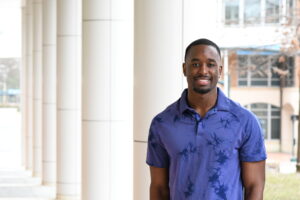Xavier Bonner is a Ph.D. candidate in the Department of Biochemistry and Biophysics at the UNC School of Medicine. He attended Morehouse College before coming to the University of North Carolina at Chapel Hill in fall 2018. His research focuses on HIV—specifically, better understanding the genotypic and phenotypic determinants of macrophage tropism—or, how HIV viruses enter different cell types. Bonner has been involved with The Graduate School’s, Diversity and Student Success program, in addition to many campus organizations. Following his upcoming graduation, he will become a strategy consultant at Triangle Insights Group.

What led you to pursue graduate school?
I did an internship at UNC-Chapel Hill, and we did a lot of protein modeling and design. That really got me invested in investigating macromolecular interactions.
How have Black mentors shaped your time at Carolina?
It’s important to find like-minded people. That can be a friend or a mentor, where you’re bouncing ideas off of, where you hear about their journey and their path, what they’re aiming for, and what might influence you. I’ve had friends bring up topics and career paths I knew nothing about, and that led me to surround myself with people who are pursuing those interests. These instances have led me to envision myself in those roles. It’s all about the vision and surrounding yourself with a good team.
How do you give back to the campus community and beyond?
There are other students who are carrying on the legacy and holding executive board member positions in the Society for Black Biomedical Scientists, an organization that I co-founded at UNC-Chapel Hill. Being able to look back at my colleagues who continue to build the organization feels good. Ultimately, it feels surreal to be at the point where everything is winding down with academics, but it has taught me that you can create a space and still be linked back to it.
I want to build a bridge for Black students who want to be a consultant, venture capitalist, or pursue other opportunities that are inside the biotech sphere. Everybody deserves a shot, no matter your skin color or background. We live in a world where now everyone has more access and there might be younger generations who know that they can become a scientist because of the space you take up now as a researcher and through volunteer work.
How have you built community at Carolina?
I have been involved in the Black Graduate and Professional Student Association programming as co-chair. I also helped build the Society for Black Biomedical Scientists during the COVID-19 pandemic. Mainly, we tried to create a space for other Black graduate students in my program at UNC-Chapel Hill and beyond, including at North Carolina Agricultural & Technical State University and at North Carolina Central University. We hosted career panels, game nights, things like that. That’s the main driver of how I’ve tried to create a community here—by building a platform for other students to be involved and participate in.
